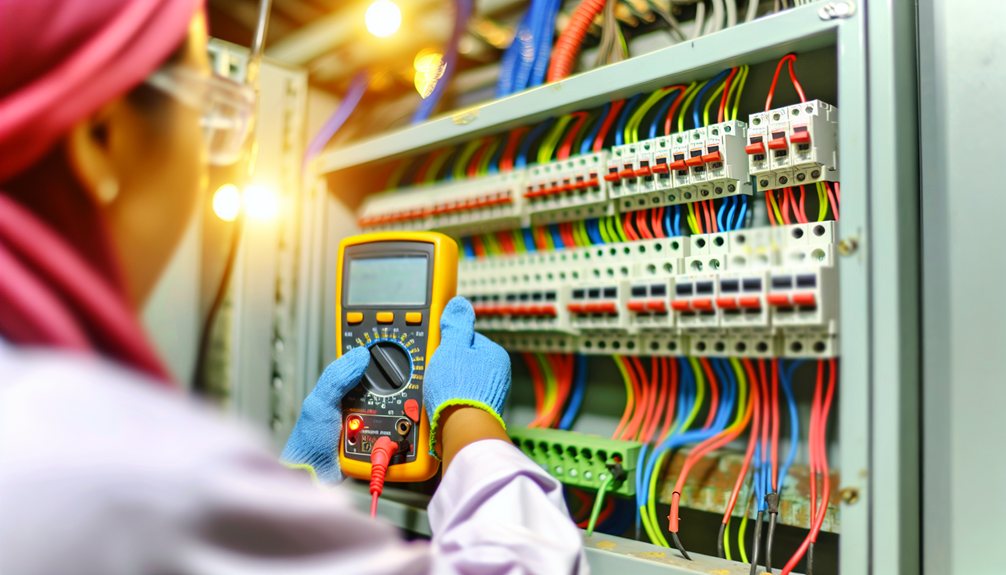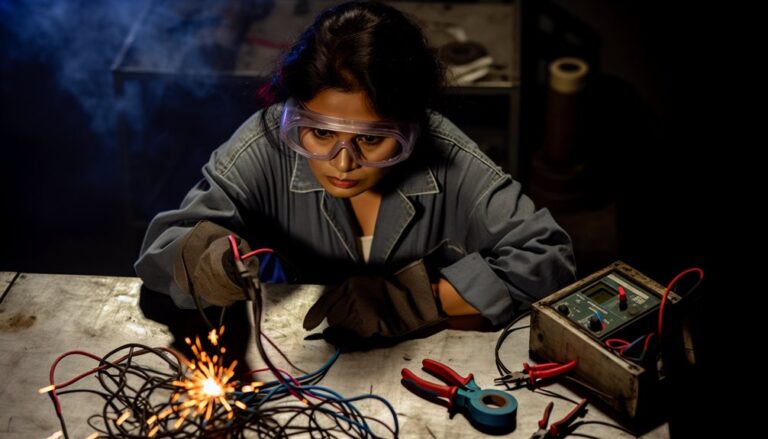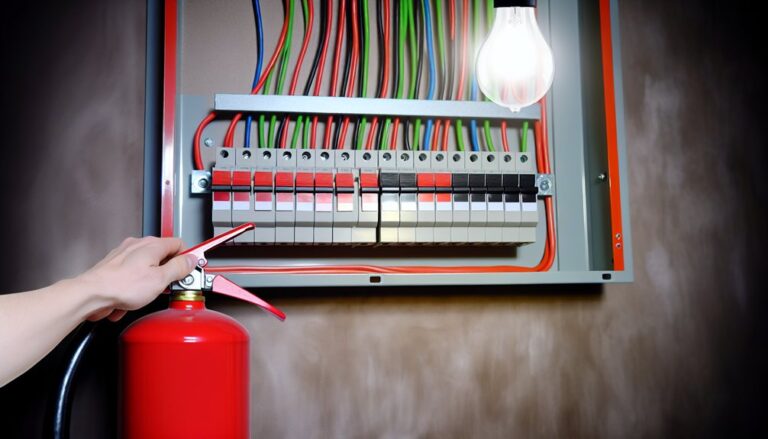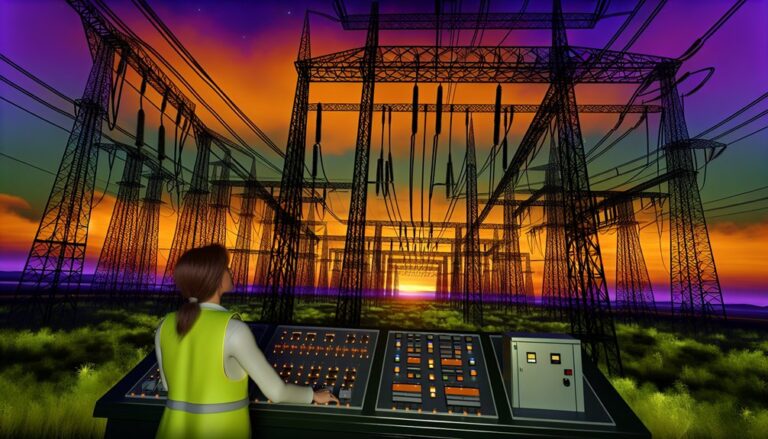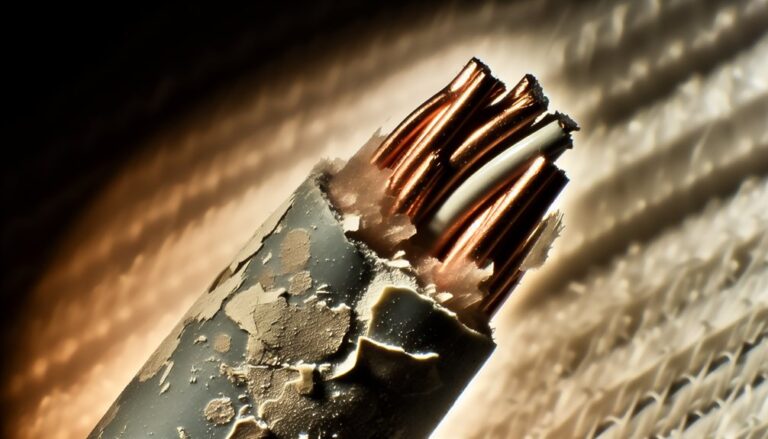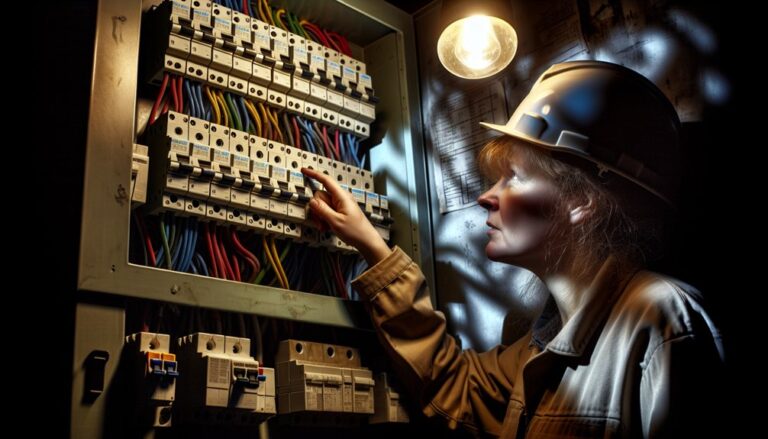Maintenance Tips for Commercial Electrical Systems
To maintain your commercial electrical systems, schedule regular inspections to catch issues early. Watch for common problems like outdated wiring, circuit overloads, or faulty connections. Keep detailed maintenance records and stay updated on technology upgrades. If you notice frequent tripped breakers or flickering lights, investigate the load capacity and inspect for wiring issues. Remember, consistent attention can enhance system reliability. To guarantee you’re following best practices, learn more about essential troubleshooting steps and professional help.
Key Takeaways
- Schedule regular electrical inspections to detect and address potential hazards before they become major issues.
- Keep detailed records of maintenance activities to track performance and identify recurring problems.
- Upgrade outdated wiring and equipment to comply with safety standards and enhance system efficiency.
- Implement preventive measures, such as load balancing, to minimize the risk of circuit overloads.
- Consult a licensed electrician immediately for any signs of electrical issues, like burning odors or flickering lights.
Importance of Regular Electrical Inspections
While you may overlook it in your day-to-day operations, regular electrical inspections are essential for ensuring the safety and efficiency of your commercial electrical systems.
These inspections allow for timely regular assessments of your wiring, connections, and equipment, identifying potential hazards before they escalate into major issues. Maintaining safety compliance not only protects your employees and customers but also minimizes costly downtime and repairs.
Regular inspections help you adhere to national and local codes, reducing the risk of legal penalties. By prioritizing these evaluations, you enhance the reliability of your systems, ensuring they operate at peak performance.
Ultimately, investing in regular electrical inspections is a proactive approach that safeguards your business and promotes longevity in your electrical infrastructure.
Common Electrical Issues in Commercial Settings
After confirming your commercial electrical systems are regularly inspected, it’s important to be aware of common electrical issues that can arise in these settings.
One prevalent problem is outdated wiring, which often necessitates wiring upgrades to meet current safety standards and accommodate increased power demands.
Additionally, improper load balancing can lead to circuit overloads, causing frequent tripped breakers or even equipment damage. You should monitor your electrical loads to confirm even distribution across circuits.
Faulty connections, signs of overheating, and flickering lights might also indicate deeper issues that require immediate attention.
Addressing these problems proactively not only prevents costly downtime but also enhances the overall efficiency and safety of your commercial electrical system.
Best Practices for Electrical Maintenance
To guarantee the longevity and reliability of your commercial electrical systems, implementing best practices for electrical maintenance is essential.
Regular attention to preventive measures not only minimizes risks but also enhances performance.
Here are three key practices you should adopt:
- Routine Inspections: Schedule regular assessments to identify wear and tear, ensuring all components function effectively.
- System Upgrades: Stay informed about the latest technology and upgrade outdated systems to improve efficiency and safety.
- Documentation: Keep detailed records of maintenance activities, inspections, and upgrades to track system performance and plan future maintenance.
Troubleshooting Electrical Problems
When you encounter electrical problems in a commercial setting, identifying the root cause swiftly can prevent costly downtime and assure safety.
Begin by inspecting for circuit overloads, which often manifest as tripped breakers or flickering lights. Confirm you’re not exceeding the circuit’s capacity by calculating the total load of connected devices.
If overloads aren’t the issue, check for faulty wiring. Look for signs of wear, such as frayed insulation or burnt connections. Use a multimeter to test for continuity and voltage irregularities.
Document any anomalies and keep a log to help identify patterns over time. Addressing these issues promptly can’t only enhance system performance but also prolong the lifespan of your electrical infrastructure.
When to Call a Professional Electrician
How can you determine when it’s time to call a professional electrician? Recognizing the signs of electrical issues is essential for safety compliance and minimizing risks. Here are three key indicators:
- Frequent Circuit Breaker Trips: If breakers trip often, it could signal overloads or wiring problems that require immediate attention.
- Burning Odors or Sparks: Any smell of burning or visible sparks indicates potential fire hazards that necessitate emergency repairs.
- Flickering Lights: Persistent flickering suggests loose connections or voltage fluctuations, which can lead to more serious issues.
When faced with these situations, don’t hesitate to contact a licensed electrician. Acting quickly guarantees your commercial electrical system remains safe and compliant, avoiding costly damage or accidents.
About Us
We understand that electrical issues can be stressful and overwhelming. That’s why we are here to lend a helping hand and provide you with the best electrical services in town. As a team of experienced electricians, we take pride in our ability to solve any electrical problem with precision and care.
Pages
Follow us
© 2026 By Electrician Fort Lauderdale Today

